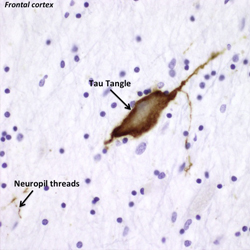 Traumatic brain injury (TBI) is an injury to the brain caused by head trauma. Millions worldwide suffer TBI in road accidents, collision sports and falls. Most cases are mild with quick recovery. Some are more serious resulting in concussion and progressive damage to brain structures. Worry about longer-term effects has increased in recent years with media coverage of repeated head injury in sport leading to problems with behaviour, mood and thinking. Military personnel are also at risk, as a blast can cause TBI even without physical impact. Axons, the long ‘wire-like’ processes linking nerve cells together, which are closely studied by our laboratory, are particularly vulnerable in TBI. Moreover, research shows that depending on the severity of injury, TBI increases the risk Alzheimer’s disease (AD) in later life by 2-4 fold the risk of Parkinson’s disease (PD) by around 3.5 fold.
Traumatic brain injury (TBI) is an injury to the brain caused by head trauma. Millions worldwide suffer TBI in road accidents, collision sports and falls. Most cases are mild with quick recovery. Some are more serious resulting in concussion and progressive damage to brain structures. Worry about longer-term effects has increased in recent years with media coverage of repeated head injury in sport leading to problems with behaviour, mood and thinking. Military personnel are also at risk, as a blast can cause TBI even without physical impact. Axons, the long ‘wire-like’ processes linking nerve cells together, which are closely studied by our laboratory, are particularly vulnerable in TBI. Moreover, research shows that depending on the severity of injury, TBI increases the risk Alzheimer’s disease (AD) in later life by 2-4 fold the risk of Parkinson’s disease (PD) by around 3.5 fold.
Although TBI prevalence is growing, its link with AD and PD is significantly understudied and the mechanism by which it could trigger biological processes in the brain that lead to the development of such disorders many years later are not well understood. This is an important gap in current research because, unlike many risk factors, TBI is usually a well-defined, single event. By understanding what happens to AD or PD related molecules (e.g. tau or alpha-synuclein) at this time, we can learn about mechanisms leading to AD and PD, and then try to block them to prevent the disease. For example, we are testing whether brain injury alters specific proteins that clump together in AD and PD leading to their spread to other brain regions in the longer term. If we can confirm this, it may be possible to block this clumping at the time of injury.
